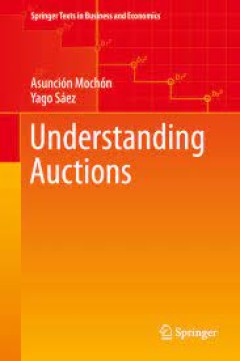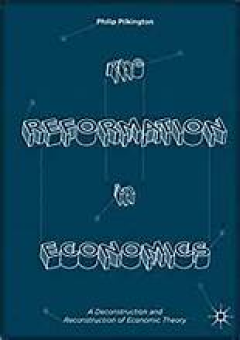Filter by

Understanding Auctions
In recent years, auctions have become an important field and many markets have designed new and sophisticated auction models to assign different types of items. The prime goal of this book is to set an organized classification of the main auction mechanisms in a way that readers can understand the importance of auction design and the advantages and drawbacks of each model. Given the relevance o…
- Edition
- -
- ISBN/ISSN
- 978-3-319-08813-6
- Collation
- -
- Series Title
- -
- Call Number
- -

Artificial Intelligence in Financial Markets: Cutting Edge Applications for R…
As technology advancement has increased, so to have computational applications for forecasting, modelling and trading financial markets and information, and practitioners are finding ever more complex solutions to financial challenges. Neural networking is a highly effective, trainable algorithmic approach which emulates certain aspects of human brain functions, and is used extensively in finan…
- Edition
- Ed. 1
- ISBN/ISSN
- 978-1-137-48880-0
- Collation
- XV, 344
- Series Title
- New Developments in Quantitative Trading and Investment
- Call Number
- 006.3 ART a

Individual and Collective Choice and Social Welfare Essays in Honor of Nick …
The papers in this volume explore various issues relating to theories of individual and collective choice, and theories of social welfare. The topics include individual and collective rationality, motivation and intention in economics, coercion, public goods, climate change, and voting theory. The book offers an excellent overview over latest research in these fields.
- Edition
- -
- ISBN/ISSN
- 978-3-662-46438-0
- Collation
- X, 377
- Series Title
- -
- Call Number
- 330

Innovations in Quantitative Risk Management: TU München, September 2013
Quantitative models are omnipresent –but often controversially discussed– in todays risk management practice. New regulations, innovative financial products, and advances in valuation techniques provide a continuous flow of challenging problems for financial engineers and risk managers alike. Designing a sound stochastic model requires finding a careful balance between parsimonious mode…
- Edition
- -
- ISBN/ISSN
- 978-3-319-09113-6
- Collation
- XI, 438
- Series Title
- -
- Call Number
- 330 INN

Innovations in Derivatives Markets Fixed Income Modeling, Valuation Adjustme…
This book presents 20 peer-reviewed chapters on current aspects of derivatives markets and derivative pricing. The contributions, written by leading researchers in the field as well as experienced authors from the financial industry, present the state of the art in: • Modeling counterparty credit risk: credit valuation adjustment, debit valuation adjustment, funding valuation adjustment, a…
- Edition
- -
- ISBN/ISSN
- 978-3-319-33445-5
- Collation
- X, 449
- Series Title
- -
- Call Number
- 330 INN

Uncertain Differential Equations
This book introduces readers to the basic concepts of and latest findings in the area of differential equations with uncertain factors. It covers the analytic method and numerical method for solving uncertain differential equations, as well as their applications in the field of finance. Furthermore, the book provides a number of new potential research directions for uncertain differential equat…
- Edition
- -
- ISBN/ISSN
- 978-3-662-52729-0
- Collation
- -
- Series Title
- -
- Call Number
- -

Trends in Mathematical Economics Dialogues Between Southern Europe and Latin…
This book gathers carefully selected works in Mathematical Economics, on myriad topics including General Equilibrium, Game Theory, Economic Growth, Welfare, Social Choice Theory, Finance. It sheds light on the ongoing discussions that have brought together leading researchers from Latin America and Southern Europe at recent conferences in venues like Porto, Portugal; Athens, Greece; and Guanaju…
- Edition
- -
- ISBN/ISSN
- 978-3-319-32543-9
- Collation
- -
- Series Title
- -
- Call Number
- -

The Fallacy of Corporate Moral Agency
It is uncontroversial that corporations are legal agents that can be held legally responsible, but can corporations also be moral agents that are morally responsible? Part one of this book explicates the most prominent theories of corporate moral agency and provides a detailed debunking of why corporate moral agency is a fallacy. This implies that talk of corporate moral responsibilities, beyon…
- Edition
- 1
- ISBN/ISSN
- 978-94-017-9756-6
- Collation
- XIV, 218, 7 b/w illustrations
- Series Title
- Issues in Business Ethics
- Call Number
- -

The Economics of the Global Environment
This is the first book combining research on the Global Environment, Catastrophic Risks and Economic Theory and Policy. Modern economic theory originated in the middle of the twentieth century when industrial expansion coupled with population growth led to a voracious use of natural resources and global environmental concerns. It is uncontested that, for the first time in recorded history, huma…
- Edition
- 1
- ISBN/ISSN
- 978-3-319-31943-8
- Collation
- VII, 649, 30 b/w illustrations, 46 illustrations in colour
- Series Title
- -
- Call Number
- -

The Reformation in Economics
This book carves the beginnings of a new path in the arguably weary discipline of economics. It combines a variety of perspectives – from the history of ideas to epistemology – in order to try to understand what has gone so wrong with economics and articulate a coherent way forward. This is undertaken through a dual path of deconstruction and reconstruction. Mainstream economics is broken d…
- Edition
- 1
- ISBN/ISSN
- 978-3-319-40757-9
- Collation
- XV, 368, 2 b/w illustrations, 19 illustrations in colour
- Series Title
- -
- Call Number
- -
 Computer Science, Information & General Works
Computer Science, Information & General Works  Philosophy & Psychology
Philosophy & Psychology  Religion
Religion  Social Sciences
Social Sciences  Language
Language  Pure Science
Pure Science  Applied Sciences
Applied Sciences  Art & Recreation
Art & Recreation  Literature
Literature  History & Geography
History & Geography